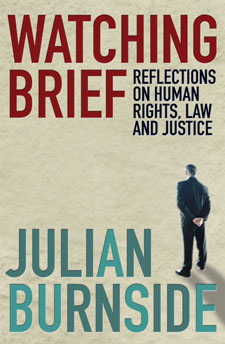Those looking for a comprehensive and coherent analysis of the issues of human rights, law and justice will be disappointed by this book.
It is largely a collection of short pieces written previously and published elsewhere by a lawyer who, through his voluntary work with refugees, has become a prophetic voice against the injustices of Australia's recent treatment of refugees.
 Burnside questions government policy, particularly what he perceives as the excesses of recent legislation designed to combat terrorism. The essays reflect the situation at the time they were written and have not been updated so the nature of the collection gives rise to repetition at times.
Burnside questions government policy, particularly what he perceives as the excesses of recent legislation designed to combat terrorism. The essays reflect the situation at the time they were written and have not been updated so the nature of the collection gives rise to repetition at times.
After two introductory essays which introduce the reader to the person of Julian Burnside, the majority of the book consists of short essays gathered under the rubric of "asylum seekers to Australia" and then, "human rights in an age of terror".
The last section departs from the contemporary commentary and explores justice through a series of short case notes. While the first case argues against the death penalty through the case of Van Nguyen, the Australian executed in Singapore in 2005 (using capital punishment) it is difficult, at times, to work out what the point is of some of the other case notes.
The personal insight into the author in the initial chapters tell us nothing about his world view and whether there is any religious commitment standing behind his concerns about human rights and justice.
Various UN Conventions on social and political rights of humans (including refugees) are cited at various points. The rationale for human rights in Australia is the allegedly shared core value of "a fair go" (p 45). These human rights are often described as self evident, inalienable, innate and yet they are then described just in case they are not self-evident to the reader.
Burnside is critical of the utilitarian arguments for curtailing the rights of the weakest and outsiders in our society (refugees and suspected terrorists). While he acknowledges that the curtailment of human rights has historically occurred during times of war he does not explore this in any depth. While he seems to leave open this possibility he argues that neither the threat of refugees or terrorism justifies the legislative actions that the previous Federal government has taken.
The problem of course is that if human rights rely on some nebulous consensus of the citizens at a particular time as to what is innate and important enough to constitute a human right then they are always going to be susceptible to being set aside when that consensus no longer exists or trumped by an overriding emergency or threat. If majority opinion determines what are human rights then a minority is always at risk.
The author acknowledges something more is needed. His solution is that we need a Charter of Rights in Australia to protect these liberties from the fickle nature of government and majority opinion. The history of human rights does not, however, support this view.
The US Constitution failed to protect African Americans for years as the Constitution's rights and freedoms were held not to apply to them. Today it fails to protect the 1.2 million foetuses that are aborted each year in the United States, because these lives are not considered sufficiently human to attract independent rights. I remain unconvinced that a Charter of Rights will cause us to love our neighbour, as the real problem is far deeper.
The author never tackles the big questions " what makes the rights innate? What makes them right? Is it just the self-interest of the golden rule "do unto others as they would do unto you"? If humans create human rights then humans can set them aside. However, if our right to be treated with dignity as a human arises from being created in the image of God and not from the promulgation of charters of rights then they should not subject to changing public opinion or the changing priorities of Government.
Stylistically this is a light, easy read however the issues that it tackles are not and the examples of the inhuman and degrading treatment of refugees are conscience searing (as they should be).
It is some of the more common inhumanities (ones not so well publicised) that hit home:
- Mothers only being allowed to take their children out of the cell once a day to take them to the toilet and having to use a plastic bag in the meantime,
- Queuing hours to use two leaking toilets shared amongst 700 detainees,
- Nurses having to cut toe nails (toe nail clippers being dangerous) but only one person per day (when there are 700 in detention),
- A young girl whose house was raided by armed officers who in fright wet her pants and is not allowed to change before being transported five hours to a detention centre.
It is these small inhumanities to which most of us can relate that are so demeaning, degrading, unnecessary and inexcusable. This book continues the already extensive documentation of the history of man's inhumanity to man.
This is not a balanced book in its treatment of the issues but then it is not intended to be. It is a book designed to create a more balanced (fairer) society and redress what the author sees as an imbalance that threatens the long term moral harm to Australia as the dignity of what it means to be human is diminished in our country. This explains its polemic character and why those responsible for the refugee and terrorism laws are the recipient of so much of the author's ire.



















